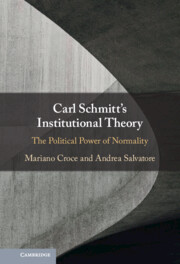Book contents
- Carl Schmitt’s Institutional Theory
- Carl Schmitt’s Institutional Theory
- Copyright page
- Contents
- Acknowledgements
- Introduction
- 1 What Is Exceptionalist Decisionism?
- 2 Looking Backwards
- 3 How Exceptionalist Decisionism Came About
- 4 A Fresh Start
- 5 Out of the Exceptionalist Quagmire
- 6 The Politics of Normality
- 7 Doing Away with Politics
- Conclusion
- References
- Index
7 - Doing Away with Politics
Schmitt’s Juristic Institutionalism
Published online by Cambridge University Press: 23 June 2022
- Carl Schmitt’s Institutional Theory
- Carl Schmitt’s Institutional Theory
- Copyright page
- Contents
- Acknowledgements
- Introduction
- 1 What Is Exceptionalist Decisionism?
- 2 Looking Backwards
- 3 How Exceptionalist Decisionism Came About
- 4 A Fresh Start
- 5 Out of the Exceptionalist Quagmire
- 6 The Politics of Normality
- 7 Doing Away with Politics
- Conclusion
- References
- Index
Summary
Chapter 7 centres particularly on the works published after the end of World War Two. While Chapter 2 contended that Schmitt was not born as a decisionist, Chapter 7 advances the claim that he did not conclude his career by adopting (or revisiting) his former decisionist approach. Quite the opposite, from the post-war years onwards decisionism faded out. After the major amendment of the early 1930s, whereby the decision was turned into a selective filter, the last remnants of decisionism were expunged. Therefore, whilst the concrete-order thinking of 1934 was still marked by a difficult cohabitation of decisionism and institutionalism, post-war texts did away completely with it so as to pave the way for Schmitt’s last, juristic version of institutionalism. This peculiar kind of institutionalism culminates in an underrated essay, The Plight of European Jurisprudence, where Schmitt affirmed the independence of jurisprudence from any external force and thereby postulated its self-sufficiency even as a source of law. The political decision is replaced by a penetrating, meticulous and inherently acephalous legal practice that is meant to buttress the evolution of social phenomena with a view to obtaining a legal order that is internally consistent and materially sustainable.
- Type
- Chapter
- Information
- Carl Schmitt's Institutional TheoryThe Political Power of Normality, pp. 125 - 142Publisher: Cambridge University PressPrint publication year: 2022



